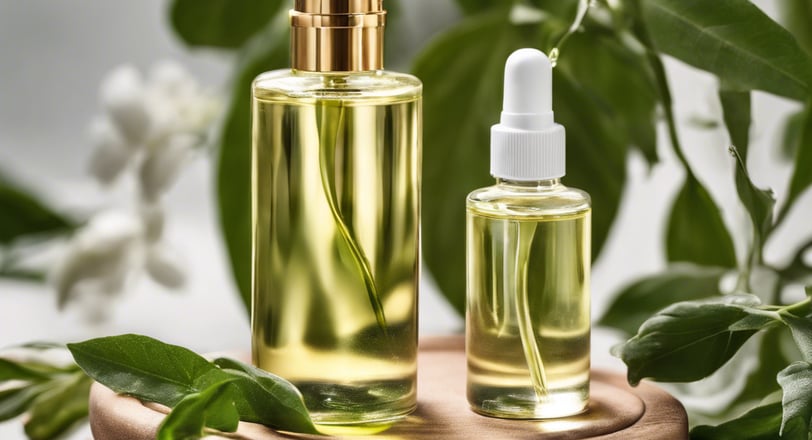The Power of Plant-Based Oils in Skincare
In the world of skincare, the pursuit of radiant, youthful skin often leads us to nature’s treasures. Among these, plant-based oils stand out as unparalleled champions, offering a bounty of benefits for all skin types. Extracted from seeds, nuts, and fruits, these oils are packed with nutrients that nourish, protect, and rejuvenate the skin.
Ifsha Mudasir
11/29/20243 min read


What Are Plant-Based Oils?
Plant-based oils are natural extracts derived from plants through processes like cold pressing or distillation. Unlike synthetic alternatives, they are rich in essential fatty acids, vitamins, and antioxidants. These oils not only moisturize but also address various skin concerns, making them a versatile addition to any skincare routine.
Why Are Plant-Based Oils Beneficial for Skincare?
The benefits of plant-based oils are rooted in their nutrient composition. These oils are celebrated for their ability to:
Hydrate Deeply: The natural lipids in plant oils penetrate the skin barrier, delivering long-lasting moisture.
Fight Free Radicals: Many oils, such as rosehip and argan oil, are high in antioxidants that combat oxidative stress, a primary cause of premature aging.
Soothe Irritation: Oils like chamomile and calendula are known for their anti-inflammatory properties, making them ideal for sensitive or reactive skin.
Enhance Skin Repair: Essential fatty acids in oils like evening primrose and borage seed support the skin’s natural healing processes.
Top Plant-Based Oils for Skincare
1. Argan Oil
Known as "liquid gold," argan oil is extracted from the kernels of the argan tree. Rich in vitamin E, omega-6 fatty acids, and antioxidants, this oil is a powerhouse for hydrating and restoring the skin.
Key Benefits: Boosts elasticity, reduces fine lines, and balances oil production.
Best For: Dry and aging skin.
2. Rosehip Seed Oil
Cold-pressed from the seeds of wild rose bushes, rosehip seed oil is a favorite among skincare enthusiasts for its regenerative properties.
Key Benefits: Brightens the complexion, reduces scars, and minimizes hyperpigmentation.
Best For: Dull and uneven skin tones.
3. Jojoba Oil
Derived from the seeds of the jojoba plant, jojoba oil closely mimics the skin’s natural sebum, making it an excellent choice for all skin types.
Key Benefits: Balances oil levels, soothes irritation, and strengthens the skin barrier.
Best For: Acne-prone and combination skin.
4. Coconut Oil
Extracted from the meat of coconuts, coconut oil is renowned for its deep moisturizing properties.
Key Benefits: Softens rough skin, protects against bacteria, and reduces inflammation.
Best For: Very dry and sensitive skin.
5. Marula Oil
Sourced from the kernels of marula fruit, marula oil is packed with antioxidants and amino acids, making it highly effective for anti-aging.
Key Benefits: Reduces fine lines, increases firmness, and delivers a radiant glow.
Best For: Mature and dehydrated skin.
How to Incorporate Plant-Based Oils into Your Skincare Routine
1. As a Moisturizer
Apply a few drops of oil to damp skin after cleansing to lock in hydration. Oils like argan and jojoba are perfect for daily use.
2. As a Serum Booster
Mix a drop or two of oil into your regular serum or moisturizer for an extra hydration boost.
3. For Cleansing
Oils such as coconut or sunflower oil can act as gentle makeup removers while nourishing the skin.
4. As a Treatment
Use targeted oils like rosehip seed oil to address specific concerns such as scars, pigmentation, or inflammation.
Debunking Myths About Plant-Based Oils
1. Oils Cause Breakouts
Contrary to popular belief, non-comedogenic oils like jojoba and argan oil do not clog pores. In fact, they can help balance excess sebum production.
2. Oils Are Only for Dry Skin
While oils are excellent for hydration, many, like tea tree oil, are beneficial for oily and acne-prone skin due to their antibacterial properties.
3. Oils Make Skin Greasy
High-quality oils absorb quickly into the skin without leaving a greasy residue. Choosing the right oil for your skin type is key.
The Sustainability of Plant-Based Oils
One of the most compelling reasons to embrace plant-based oils is their sustainability. Ethical sourcing and eco-friendly production methods ensure that these oils benefit both your skin and the planet. Many brands prioritize fair trade practices and use recyclable packaging, further enhancing their appeal.
Choosing High-Quality Plant-Based Oils
When selecting plant-based oils, it is crucial to prioritize quality. Look for:
Cold-Pressed Oils: These retain the maximum nutrients.
Organic Certification: Ensures the oils are free from pesticides and chemicals.
Transparent Sourcing: Supports ethical and sustainable practices.
Conclusion
The transformative power of plant-based oils in skincare cannot be overstated. From deep hydration to targeted treatment, these oils offer a natural, effective, and eco-conscious way to enhance your skin’s health. By incorporating the right oils into your routine, you can unlock radiant, youthful skin while making a sustainable choice for the environment.
Invest in the beauty of nature and let plant-based oils reveal the best version of your skin.
